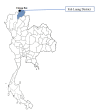Acceptance and accessibility to the early phase COVID-19 vaccination among the healthcare workers and hill tribe population in Thailand
- PMID: 35773315
- PMCID: PMC9244445
- DOI: 10.1038/s41598-022-15149-y
Acceptance and accessibility to the early phase COVID-19 vaccination among the healthcare workers and hill tribe population in Thailand
Abstract
Coronavirus disease 2019 (COVID-19) is a serious emerging disease and an extreme threat to human life. This study aimed to understand the perceptions of hill tribe people living in the border areas of Thailand-Myanmar and health workers regarding the acceptability and accessibility of the COVID-19 vaccine and health workers' perceptions of the readiness to implement the vaccination program during the early period of national COVID-19 vaccination. A qualitative method was applied to elicit information from key informants who lived in hill tribe villages and the health professionals who served them. The study was conducted in seven hill tribe villages located along the Thailand-Myanmar borders in Mae Fah Luang District, Chiang Rai Province, Thailand. The participants were hill tribe villagers aged 20 years and over; public health care professionals working in village health centers who had primary roles in implementing disease prevention and control measures; and public health care professionals working in districts and provincial public health offices who had primary roles in policy development and implementation. A total of 63 participants (26 men and 37 women) from seven hill tribe villages provided information. Three acceptance choices regarding receiving the COVID-19 vaccine were found among the hill tribes: definite acceptance, likely acceptance, and no preference. Two factors related to obtaining access to the new COVID-19 vaccine were found: Thai citizenship and the level of literacy related to the vaccine. There was no process or protocol in place for implementing the new vaccine among health professionals working at the district, subdistrict, or community levels, but the national expanded immunization program (EPI) system was clearly demonstrated to extend throughout the health service chain in Thailand. During the early period of national COVID-19 vaccine implantation in Thailand, not all members of the hill tribes accepted the vaccine; participant acceptance depended on several factors, including a participant's previous experience with vaccination, whether he or she required more information before making a decision, etc. While acceptance of the vaccine depended on the individual's background, not everyone had an equal opportunity to access the vaccine. The new COVID-19 vaccine should be available at the village level, including in hill tribe villages, to reduce the systemic threat to the country.
© 2022. The Author(s).
Conflict of interest statement
The authors declare no competing interests.
Figures
Similar articles
-
Impacts of and survival adaptations to the COVID-19 pandemic among the hill tribe population of northern Thailand: A qualitative study.PLoS One. 2021 Jun 4;16(6):e0252326. doi: 10.1371/journal.pone.0252326. eCollection 2021. PLoS One. 2021. PMID: 34086727 Free PMC article. Clinical Trial.
-
Experiences and expectations regarding COVID-19 prevention and control measures among the hill tribe population of northern Thailand: a qualitative study.BMC Public Health. 2021 Jun 4;21(1):1060. doi: 10.1186/s12889-021-11145-5. BMC Public Health. 2021. PMID: 34088306 Free PMC article.
-
Prevalence of and factors associated with scrub typhus exposure among the hill tribe population living in high incidence areas in Thailand: a cross-sectional study.BMC Public Health. 2023 Dec 1;23(1):2394. doi: 10.1186/s12889-023-17313-z. BMC Public Health. 2023. PMID: 38041104 Free PMC article.
-
A 20-year retrospective cohort study of TB infection among the Hill-tribe HIV/AIDS populations, Thailand.BMC Infect Dis. 2016 Feb 9;16:72. doi: 10.1186/s12879-016-1407-4. BMC Infect Dis. 2016. PMID: 26861536 Free PMC article. Review.
-
COVID-19 vaccine acceptance among health care professionals in Ethiopia: A systematic review and meta-analysis.Hum Vaccin Immunother. 2023 Dec 31;19(1):2188854. doi: 10.1080/21645515.2023.2188854. Epub 2023 Mar 22. Hum Vaccin Immunother. 2023. PMID: 36949629 Free PMC article.
Cited by
-
COVID-19 vaccine wastage in Thailand amidst vaccine inequity and pandemic-to-endemic transition.Public Health Chall. 2023 Feb 1;2(1):e66. doi: 10.1002/puh2.66. eCollection 2023 Mar. Public Health Chall. 2023. PMID: 40496961 Free PMC article.
-
Beliefs, taboos, usages, health perceptions, and practices toward wildlife among different ethnicities in Tak and Mae Hong Son Provinces, Thailand.BMC Public Health. 2024 Sep 6;24(1):2432. doi: 10.1186/s12889-024-19941-5. BMC Public Health. 2024. PMID: 39242509 Free PMC article.
-
Acceptance of COVID-19 vaccine booster dose among the people of Bangladesh: A cross-sectional study.Heliyon. 2023 Nov 11;9(11):e22215. doi: 10.1016/j.heliyon.2023.e22215. eCollection 2023 Nov. Heliyon. 2023. PMID: 38053887 Free PMC article.
References
-
- Srichan P, Apidechkul T, Tamornpark R, Yeemard F, Khunthason S, Kitchanapaiboon S, et al. Knowledge, attitudes and preparedness to respond to covid-19 among the border population of northern Thailand in the early period of the pandemic: A cross-sectional study. WHO South-East Asia J. Public Health. 2020;9(2):118–125. doi: 10.4103/2224-3151.294305. - DOI - PubMed
-
- Sumner, A., Hoy, C. & Ortiz-Juarez, E. Estimates of the Impact of Covid-19 on Global Poverty. United Nations University World Institute for Development Economics Research. https://www.researchgate.net/publication/340456156 (Accessed 29 June 2021).
Publication types
MeSH terms
Substances
LinkOut - more resources
Full Text Sources
Medical
Miscellaneous


